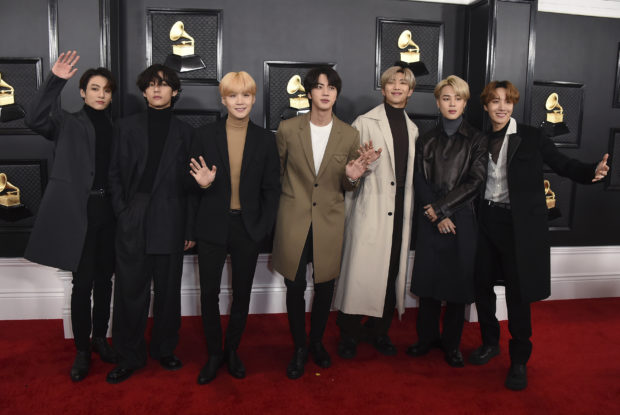SEOUL, South Korea — As American protesters took to the streets to mourn the death of George Floyd, they found an unexpected ally: K-pop fans.

FILE – In this Jan. 26, 2020 file photo, K-pop band BTS arrives at the 62nd annual Grammy Awards in Los Angeles. The band donated $1 million to Black Lives Matter campaign. (Photo by Jordan Strauss/Invision/AP, File)
Floyd died May 25 after a police officer pressed his knee into his neck for several minutes even after he stopped moving. K-pop fans galvanized by police brutality and political disappointments swiftly mobilized, re-purposing their usual platforms and hashtags from boosting their favorite stars to backing the Black Lives Matter movement.
They flooded right-wing hashtags and police apps with short video clips and memes of their K-pop stars.
In a tweet Thursday to its 26 million fans, South Korean boy band BTS said it opposes racial discrimination and violence and announced a $1 million donation to Black Lives Matter.
Fans quickly followed suit with the hashtag #MatchAMillion on Twitter, matching the donation after 24 hours according to “One “One In An ARMY,” a global fundraising team made up of BTS fans.
Even so, political activism isn’t exactly associated with K-pop fans. Over the years, K-pop fans have gained notoriety for overtaking Twitter trends and Instagram feeds.
The loose network of fans mobilizes in a heartbeat — usually to promote new songs from their favorite K-pop artists or to put down their critics. That same social media energy is being repurposed to support the Black Lives Matter movement, and BTS fans, known as ARMY, are at the forefront.
Chloë Gallot, a French university student, said she joined ARMY — Adorable Representative M.C. for Youth — earlier this year when she “fell into the rabbit hole” while searching for a distraction from the coronavirus outbreak and personal troubles.
A few days ago, Gallot became one of the ARMY members to respond to the #MatchAMillion hashtag, donating around $90 to Black Lives Matter.
“They (BTS) are pushing us to use our platforms even more.” Gallot told The Associated Press, adding that BTS fans, including herself, had already started fundraising before BTS’ donation was made public.
K-pop experts say zealous activism is nothing new for the fans.
“Despite the stereotypes about boy band fans, they are known for being politically aware and helping raise money for charitable causes online, especially on Twitter,” said Hyun-su Yim, K-pop reporter at the Korea Herald.
“Which is why it took many people by surprise when the fandom spearheaded efforts to drown out racist hashtags,” Yim said, referring to K-pop fandoms clogging up U.S. police apps and flooding racist hashtags like “whitelivesmatter” and “WhiteOutWednednesday” with their favorite K-pop memes and fancies, rendering them useless.
Although K-pop has been popular in Asia for decades, the rise of BTS around the mid-2010s has grown fans in all corners of the world. However, that global expansion has sometimes created tension within the industry, spurred by multiple factors including language and cultural differences.
Korean artists and labels have been thrust into uncharted territories where they’re forced to take a stance on social issues, drawing criticism from fans who say some issues are too far-removed from their own backyards.
Danny Kim, who runs “DKDKTV,” a popular YouTube channel on all things K-pop, points out that Korean celebrities are not known to be vocal about social issues. “The general perception of a celebrity is ‘he’s not there to voice his opinion — he’s there to for the enjoyment of the people,'” Kim said.
He also said K-pop stars are often bound by legal contracts, keeping them from making remarks that could come cause friction.
Joseph Dorsey, a black fan from Chicago, said he wants K-pop artists to support the Black Lives Matter movement because the music industry has long benefited from adopting “black American music and black American culture.”
Kim thinks it’s time for K-pop stars to speak themselves.
“K-pop has become not strictly a Korean thing anymore.”